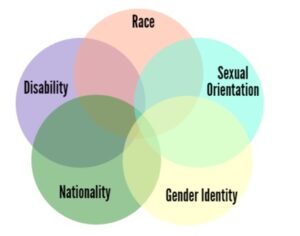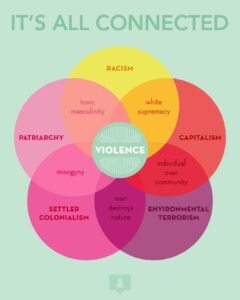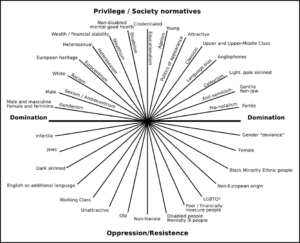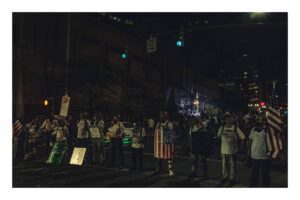April Gallaty was born into a military family. Her father was a Vietnam veteran who ran for Sheriff when she was a child, and many members of her family and extended family are either active duty or retired military. She has a strong respect for the military, she says, but “a healthy distrust of the police state” that came from growing up around such distrust.
“I grew up in a house with guns at the ready for an emergency,” Gallaty said. The implied emergency that needed to be prepared for was, Gallaty recalls, “if the government oversteps its boundaries.” She had gotten away from this worldview and line of thinking, describing it as “extreme” and “crazy.” But as doubt arises that Donald Trump will accept election results in November, (1) his attempts to undermine the validity of the election and to delay it, (2) and the recent advent of federal agents taking protesters off the street in unmarked vehicles, (3) Gallaty is reconsidering this opinion. “I am starting to realize that…what I thought was my ‘crazier’ family member’s delusions aren’t so delusional.”
“I was watching friends get pummeled every night on their feeds on Facebook and YouTube,” Gallaty said. “They were being attacked from my perspective, yet the news was saying the protesters were rioting and it was being insinuated that the entire city was on fire and it was pure bedlam. Well, how the heck would I know? I’ve been hiding in my house since March and not been around the city much.” So, out of a mixture of guilt, curiosity, disbelief, and a hope for answers, Gallaty went to a protest. “I was curious if it was as bad as I was seeing on TV.”
She later shared a write up of what she saw and experienced on Facebook, leading in with the statement that “[t]he protesters aren’t as violent as you are being shown on the news, the city isn’t under siege 24/7 and we need to organize in new ways.”
In all of her discussions about the Black Lives Matter movement, the Portland protests, and her involvement in both, Gallaty remains conscious of her privilege as a middle class white woman. The intersection of white privilege and class privilege is often an important one to acknowledge in discussions of race relations in America, as these things coupled together often lead to a significant difference in lived experiences as compared to those who do not share white and/or middle-class identities, (4)(5) something Gallaty is keenly aware of. “I’ve spent a lot of time trying to put my redneck days behind me,” she said. “I’ve married well…I just happily skipped into a middle-class status and did all the middle-class status things…I was even fortunate enough to be able to buy a second home and rent out the other one in all my years of middle-class white life.”

Gallaty wasn’t blinded by her privilege—rather, she was able to see that what had worked for her didn’t seem to work for others who didn’t share the benefits of being a member of privileged social classes. “[W]e’ve watched our neighbors and friends struggle to get ahead,” she said. “If they had one little mistake on their record, the struggle to get ahead was even harder for them. If that person was female, a person of color, any part of LBGTQ+, etc, the struggle compounded on them even more for each…addition to their description.”
What Gallaty is describing is the theoretical framework of intersectionality in action. Intersectionality was coined by Professor Kimberlé Crenshaw in 1989 “to describe how race, class, gender, and other individual characteristics “intersect” with one another and overlap.” Intersectionality has become a hot topic in activism of all varieties, as employing an intersectional framework into activism ideally allows activists to see, understand, and address the different lived experiences of the populations they advocate for. “The lived experiences—and experiences of discrimination—of a black woman will be different from those of a white woman, or a black man, for example,” (6) and that means that the needs of different people will be different based on their intersecting identities.

“People are struggling and it is people close to me that I care about,” Gallaty said of watching these effects in real time. “I…see that more people can’t make the system work for them like it has for me. That tells me that something is wrong with the system. And honestly, I have the same worries as anyone. One major health problem and all my cushions would be gone, so I recognize I don’t have it as good as I pretend to…
“I was dumbfounded at what I was beginning to realize. Why isn’t the system working for everyone? Hell, I deliberately wear purple hair and cover myself in tattoos and I still get away with a lot because of my credit score and credit card. Why isn’t everyone around me having my luck? They asked for advice and I gave it and it’s not working? …So, what’s going on? Could it be my skin color?”
It is this understanding that primed Gallaty to be receptive to the message of the Black Lives Matter protests. Early in the evening on her visit to a protest, before the protests began, she observed vehicles with no license tags entering and exiting the IRS building. “I watched a truck go in and it had no license tag,” she said. “Wait? What? Why, that’s illegal! …My inner Karen was incensed.
“Then, the part of me that is the white woman, law-abiding citizen in me thought, ‘No. That was probably a new car. Waiting on tags. Whatever. The police won’t do illegal things to their own neighbors. I mean, they say these are out of town Feds, but they won’t let them get away with shit like that.’ When I tell you that white women are trained to expect the best behavior in authority and excuse little transgressions, I am not lying. It’s hard to get out of that habit.”

Many of us who are white have been strongly socialized to assume best intent on the part of authorities, in particular with regards to police. Police have, after all, been sold to us as people who “Protect and Serve” since the 1950’s, and in recent decades we’ve been inundated with more police procedural dramas than can easily be counted. America’s culture of hero worship centered around the police is blatant when considering the special deference cops facing charges are often greeted with in court. This is “thanks to the widespread perception that they are heroic public figures valiantly trying to protect us,” wrote David Feige for Slate. (7) It is this culture, coupled with laws such as qualified immunity which effectively shelter police officers from accountability, and recognizing and changing this is a key piece of the Black Lives Matter movement.
“I went to see what was going on for myself because I am just like every person who has excused transgressions from officials thinking that it won’t happen again or that it can’t happen again,” Gallaty said. “But it does happen over and over. The officials are getting greedier and bolder and more open about what they think they can and will get away with. I realized in the heat of things and after going over the experience, that the city of Portland might be the easiest target for our cowardly president to make an example out of and he will kill people to do it. I really don’t want to see anyone else die and I want the BLM Movement to keep its momentum without all this extra added interference.”
While federal agents have reportedly withdrawn from Portland since the time of this interview (8) (though some protesters on the ground dispute that this is true), the effect lingers. In late July mayors from across the nation urged Congress to block Mr. Trump’s intended “surge” of federal agents into cities including Seattle, Chicago, and Kansas City. (9) Nonetheless, many protesters are waiting for the next blow.
“People I’ve shared microphones and a beer with are getting beaten to death and getting PTSD from being attacked,” said Gallaty. “The [knowledge] of the POC who’ve dealt with this all this time hit me really hard. I was ashamed, disgusted, and pissed. The BLM [movement] needs to be focused on Black Lives and not dealing with the extra added stress of an up and coming police state…”

Indeed, Black Lives Matter activists have expressed frustration at the message being lost amid the rise of violence in Portland. There is a prevalent anxiety that the protests in Portland have shifted focus in response to the violence of local police and federal agents. Furthermore, that violence has had the desired effects for many would-be protesters and folks who have been active in the protests: there is a fear of being brutalized or having one’s life massively disrupted by arrests. Gallaty herself admits to being afraid in the face of these tactics:
“I’m scared to stand up for [this movement],” she said. “I do know this is wrong and it is distracting us from our focus…the focus on BLM was right and the government is scared of that. I’m scared that if we let the government come in and beat down our people to stop what was originally peaceful protests, they will come in anytime they decide they don’t like something we do. After that, it’ll go beyond us to other cities. What will stop them from coming for you next? That’s not a democracy, that’s a police state.
“It has been reported that the reason the extra goons are being sent into Portland is because the people holding the protesters back are getting tired,” Gallaty said, referring to protesters’ beliefs that the federal agents allowed for local police officers to recoup and prepare to come back in force. Because of this, Gallaty advocates for increased daytime protests as well. “Those of us who can hang out during the day need to organize and go hang out where the police and federal agents are coming into and out of the building and take pictures of their cars and their faces if we can…I also think we need to start disrupting and keeping the numbers up on a consistent basis throughout the day. The bigger the crowds during the day, the bigger the impact it will make because they won’t have the ability to get in or out and they won’t get any real sleep or rest. Our only and best peaceful option is our numbers.
“We (middle class white folks) have all been conditioned to think the system is this great and wonderful thing that will protect us and take care of us if we just behave and do what we are supposed to,” Gallaty said. “It’s too easy for ‘average white American person to dismiss this as something that is just the ‘bad people of the city’ causing trouble under the guise of the BLM movement because it only happens at night. The activities of the protest need to be visible during the day. The federal officers need to feel the weight our numbers…[and] the people that hold onto [belief in the system] are the ones that need to be mobilized because they won’t believe it until they see it.”
“The only thing we have at our advantage is numbers. We have to come out in force and this will mean so many disruptions in the real world for a lot of people and it means not hiding behind our responsibilities and our comforts and fail-safes as a reason to stay home. If we let our neighbors fail, we fail,” Gallaty said, highlighting the importance of setting aside worries about comfort and wealth. “They know the BLM movement is valid and for some reason don’t understand that it will help all people in the end,” she said, stressing that the movement stands to improve the lives of everyone by securing better civil rights and creating momentum for greater equity.
“Again, and it can’t be said enough, [the presence of the federal agents is] completely distracting from the BLM movement,” Gallaty said. “We can’t seem to make it just stop without rolling over to the federal government at this point and I don’t think that’s an option. I don’t want that…
“I want to organize people to come out during the day, starting in the early morning one morning soon and stand outside and take pictures of the unmarked cars and their drivers going into the buildings for the police station and IRS parking. Also, it’s going to have to be a large number of us to make it effective.”

For plans such as these, the timing couldn’t be better. COVID-19 has wreaked havoc on American communities and systems since February, revealing the weaknesses in our health systems and social safety nets and causing upwards of 160,000 confirmed deaths. Widespread lock-downs have, however, freed up time and energy for many people who are often too overworked and too concerned about making ends meet to deeply invest in activism. Black Lives Matter isn’t the only civil unrest that has occurred during COVID-19 lock-downs—there have been rent strikes and worker strikes across the country. America has arguably been at a tipping point for years, with the wealth gap having more than doubled between 1989 and 2016 (10) and racial bias and discrimination becoming increasingly visible with the advent of the internet and camera phones. In many ways, America has been a tinder box for decades, and COVID-19 is assisting with the lighting of a match—if not itself being the inciting spark.
“I think we need to keep the streets as full of people all day long, as much as possible,” Gallaty said, hoping for sustained and organized pressure on the local government and police bureau. “Hopefully, that will translate into a changing of shifts to the evening protesters and try to keep it going for several days….Wouldn’t it be nice if we were the lead city in showing the US how to manage making things right for the POC in our city and state?
“Buildings can be cleaned. Lives cannot be restarted. Eyes can’t be fixed. Holes in foreheads leave permanent damage,” Gallaty said. “I want Portland to be a shining example to the rest of the US, not a warning.”
(1) Panetta, G. (2020, July 19). Trump hints that he could refuse to accept the results of the 2020 election if he loses. Retrieved August 07, 2020, from https://www.businessinsider.com/trump-suggests-that-he-wont-accept-the-2020-election-results-if-he-loses-2020-7
(2)Donald Trump suggests delay to 2020 US presidential election. (2020, July 30). Retrieved August 07, 2020, from https://www.bbc.com/news/world-us-canada-53597975
(3)Katie Shepherd, M. (2020, July 18). ‘It was like being preyed upon’: Portland protesters say federal officers in unmarked vans are detaining them. Retrieved August 07, 2020, from https://www.washingtonpost.com/nation/2020/07/17/portland-protests-federal-arrests/
(4)Emba, C. (2016, January 16). Opinion | What is white privilege? Retrieved August 07, 2020, from https://www.washingtonpost.com/blogs/post-partisan/wp/2016/01/16/white-privilege-explained/
(5)Class Privilege: Definition & Examples. (2016, May 30). Retrieved from https://study.com/academy/lesson/class-privilege-definition-examples.html.
(6)Coaston, J. (2019, May 20). The intersectionality wars. Retrieved August 07, 2020, from https://www.vox.com/the-highlight/2019/5/20/18542843/intersectionality-conservatism-law-race-gender-discrimination
(7)Feige, D. (2015, May 25). The Myth of the Hero Cop. Retrieved August 07, 2020, from https://slate.com/news-and-politics/2015/05/the-myth-of-the-hero-cop-police-unions-have-spread-a-dangerous-message-about-americas-law-enforcement-officers.html
(8)Baker, M., & Kanno-youngs, Z. (2020, July 29). Federal Agencies Agree to Withdraw From Portland, With Conditions. Retrieved August 08, 2020, from https://www.nytimes.com/2020/07/29/us/protests-portland-federal-withdrawal.html
(9)Wise, A. (2020, July 27). Mayors Demand Congress Block Trump From Deploying Federal Agents To Cities. Retrieved August 08, 2020, from https://www.npr.org/sections/live-updates-protests-for-racial-justice/2020/07/27/895904023/mayors-demand-congress-block-trump-from-deploying-federal-agents-to-cities
(10)Schaeffer, K. (2020, May 31). 6 facts about economic inequality in the U.S. Retrieved August 08, 2020, from https://www.pewresearch.org/fact-tank/2020/02/07/6-facts-about-economic-inequality-in-the-u-s/